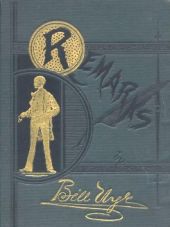Remarks
by Bill Nye

The Arabian language belongs to what is called the Semitic or Shemitic family of languages, and, when written, presents the appearance of a general riot among the tadpoles and wrigglers of the United States.
The Arabian letter “jeem” or “jim,” which corresponds with our J, resembles some of the spectacular wonders seen by the delirium tremons expert. I do not know whether that is the reason the letter is called jeem or jim, or not.
The letter “sheen” or “shin,” which is some like our “sh” in its effect, is a very pretty letter, and enough of them would make very attractive trimming for pantalets or other clothing. The entire Arabic alphabet, I think, would work up first-rate into trimming for aprons, skirts, and so forth.
Still it is not so rich in variety as the Chinese language. A Chinaman who desires to publish a paper in order to fill a long felt want, must have a small fortune in order to buy himself an alphabet. In this country we get a press, and then, if we have any money left, we lay it out in type; but in China the editor buys himself an alphabet and then regards the press as a mere annex. If you go to a Chinese type maker and ask him to show you his goods, he will ask you whether you want a two or a three story alphabet.
The Chinese compositor spends most of his time riding up and down the elevator, seeking for letters and dusting them off with a feather duster. In large and wealthy offices the compositor sits at his case with the copy before him, and has five or six boys running from one floor to another, bringing him the letters of this wild and peculiar alphabet.
Sometimes they have to stop in the middle of a long editorial and send down to Hong Kong and have a letter cast specially for that editorial.
Chinese compositors soon die from heart disease, because they have to run up stairs and down so much in order to get the different letters needed.
One large publisher tried to have his case arranged in a high building without floors, so that the compositor could reach each type by means of a long pole, but one day there was a slight earthquake shock that spilled the entire alphabet out of the case, all over the floor, and although that was ninety-seven years ago last April, there are still two bushels of pi on the floor of that office. The paper employs rat printers, and as they have been engaged in assorting and distributing this mass of pi, it is called rat pi in China, and the term is quite popular.
When the editor underscores a word, the Chinese compositor charges $9 extra for italicizing it. This is nothing more than fair, for he may have to go all over the empire, and climb twenty-seven flights of stairs to find the necessary italics. So it is much more economical in China to use body type mostly in setting up a paper, and the old journalist will avoid caps and italics, unless he is very wealthy.
Arabian literature is very rich, and more especially so in verse. How the Arabian poets succeeded so well in writing their verse in their own language, I can hardly understand. I find it very difficult to write poetry which will be greedily snapped up and paid for, even when written in the English language, but if I had to paw around for an hour to get a button-hook for the end of the fourth line, so that it would rhyme with the button-hook in the second line of the same verse, I believe it would drive me mad.
The Arabian writer is very successful in a tale of fiction. He loves to take a tale and re-write it for the press by carefully expunging the facts. It is in lyric and romantic writing that he seems to excel.
The Arabian Nights is the most popular work that has survived the harsh touch of time. Its age is not fully known, and as the author has been dead several hundred years, I feel safe in saying that a number of the incidents contained in this book are grossly inaccurate.
It has been translated several times with more or less success by various writers, and some of the statements contained in the book are well worthy of the advanced civilization, and wild word painting incident to a heated presidential campaign.
 Continue...
Continue...![[Buy at Amazon]](http://images.amazon.com/images/P/B000875S1G.01.MZZZZZZZ.jpg)